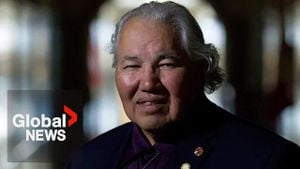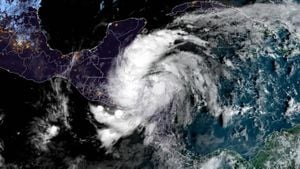Donald Trump’s return to the presidency has opened the door to renewed discussions on global trade, and it seems everyone is gearing up for what lies ahead. With his promises to reintroduce tariffs and revamp trade policies, international companies are reconsidering their investment strategies, especially those tied closely to the tech sector.
Foxconn, Pegatron, and Quanta Computer, key suppliers for tech giants like Nvidia and Apple, are preparing to ramp up U.S. investments. Foxconn chairman Young Liu has made it clear: “We can very quickly adjust our investment if necessary,” he stated at the investor’s conference, emphasizing the company's readiness to adapt to changing trade policies.
Pegatron, known for its partnerships with Tesla and Microsoft, echoed this sentiment. Co-CEO Johnson Deng hinted at the company's ability to convert existing facilities, such as their Indiana repair center, to full production if tariffs necessitate it. Similarly, Quanta Computer’s Mike Yang mentioned their capacity for fast expansion, especially at their California plant, showcasing the proactive stance these companies are taking as Trump’s second term approaches.
Trade experts note the brainwave of optimism surrounding AI as the industry’s growth driver through 2025, at least until political climate shifts under Trump’s protectionist policies come to fruition. During his campaign, Trump’s focus on America First has introduced uncertainty, particularly for supply chains heavily intertwined with other nations.
Meanwhile, Governor Yang Chin-long of Taiwan’s central bank addressed the anticipation surrounding Taiwan Semiconductor Manufacturing Company's planned $65 billion investment to bolster U.S. manufacturing. He reassured stakeholders, saying, “I don't think the United States would penalize Taiwan,” indicating hope for stability amid the potential upheaval from Trump's return.
While the tech giants align their strategies, it is evident there is nervous energy among Canadian businesses, too. Concerns are mounting as some suggest Trump’s potential 10% tariffs on imports could siphon off as much as 5% from Canada’s GDP. The impact on consumer confidence and business investments hangs heavy over the heads of Canadian leaders, echoing fears of his prior terms.
Robert Lighthizer, Trump’s former trade representative, stated bluntly, “What was once a nearly unanimous Washington consensus on free trade is now dead.” His words reveal the paradigm shift away from free trade—a sentiment many Americans seem to share. Former manufacturing jobs have felt the brunt of globalization, leading many to echo Trump’s claim of disastrous outcomes from unfettered imports.
Despite the fears, there’s also evidence of win-win situations arising from recent agreements. The United States-Mexico-Canada Agreement (USMCA), often hailed as an upgrade to NAFTA, shows how renegotiated deals can thrive under contentious circumstances. According to TD Economics, trade between Canada, the U.S., and Mexico has surged by over 30% since implementing this deal; $1.5 trillion worth of increased trade is no small feat.
Trump’s impact on trade extends beyond America’s borders, igniting reactions from nations around the world. The looming rhetoric of tariffs has traders wary, yet some countries, like Malaysia, view the potential chaos as opportunity. Under Trump’s earlier administration, Malaysia struck deals with both American and Chinese firms, inviting investments worth billions. With Trump back, they are signing off on new economic agreements to create special zones aimed at attracting more multinational companies.
Singapore and Malaysia are finalizing plans for greater economic integration, enhancing avenues for multinational corporations seeking to circumvent Trump’s anticipated tariffs. While construction efforts intensify, their proximity to each other provides a unique strategic advantage to capitalize on the shifting dynamics of global trade.
Yet, not everyone is optimistic. Concerns linger over Malaysia’s history, particularly the scandals involving alleged corruption. Political instability is actively questioned as well, with Prime Minister Anwar Ibrahim grappling with the realities of leadership amid relentless scrutiny. With recent challenges to their economic outlook, they must demonstrate adaptability.
Japan's Prime Minister Shinzo Abe has his own worries. He’ll have to navigate the complicated waters of trade relations, particularly with Trump signaling shifts away from preferential treatment for Japanese automobiles. The memory of tariffs under Trump's prior term hangs heavy, dictation large-scale automotive plans for Japan and beyond.
Trump’s wartime strategies will push competitors like Vietnam under scrutiny. For Vietnam, the past has consolidated them as allies within the supply chain; will they still hold favor, or will U.S. demands see them on the receiving end of potential sanctions? The pressure to remain aligned is tangible, especially amid concerns about adherence to international trade rules.
The narrative isn’t unique to Southeast Asia. Canadian foreign minister Mélanie Joly has said Canada is ready to play ball, but the hurdles are significant. Tariffs loom on the horizon, shooting negotiations and future collaborations squarely to the ground.
Scott Lincicome at the Cato Institute warns, “To try to decouple these two economies even a little bit is like doing surgery without anesthesia,” stressing how deeply intertwined the economies are. For now, talk of disentanglement from free trade agreements feels like idle speculation, teetering on the precipice of significant fallout.
Counteracting the threats posed by Trump’s potential policies involves adjustment on Canada’s part, considering tariffs have already taken root among many sectors. Canada has retaliated similarly, enforcing tariffs on Chinese steel products, mirroring American practices, indicating they are preparing for the long-term game.
At the same time, Lincicome challenges the notion free trade is merely detrimental. He argues “Most of us benefit,” noting the benefits typically outweigh concentrated losses felt through specific industries. His insights capture the tumultuous thoughts superimposed over ordinary governance, enticing political imaginations.
Canada’s government prepares for substantial shifts. No models exist for evaluating the impact of Trump’s return and global trade upheaval on long-established relationships. But it draws attention to unilateral decisions by the U.S. impacting relationships across borders.
Most eyes are glued to Trump’s next moves as tech suppliers brace for upheaval. Companies, analysts, and government officials have begun re-evaluations all across the board. The story of America’s trade relations is one of rising tensions, bracing for impact, and redesigning relationships within the global economy.
All eyes are on how Trump's administration will shape the future landscapes of trade agreements and policies and what pivot points may arise to inspire adjustments or even innovation among nations traditionally reliant on long-standing agreements.
If history has taught anything, it’s the power of adaptability and resilience—two traits undoubtedly required as the world navigates these uncharted waters.



